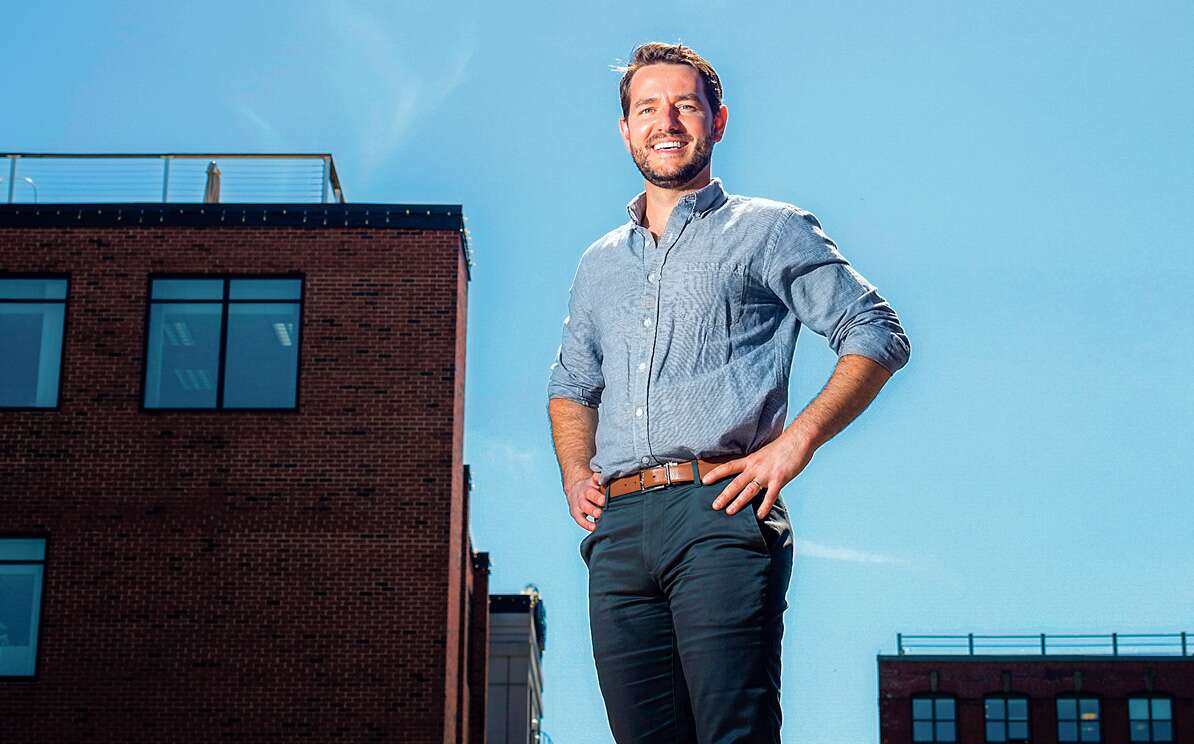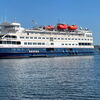
Processing Your Payment
Please do not leave this page until complete. This can take a few moments.
Entrepreneurs on a mission: Three Maine eco-innovators out to conquer the green economy
 Photo / Tim Greenway
Ocean researcher Ariadne Dimoulas is founder and CEO of a startup that aims to put a lid on disposable consumer goods made from plastic.
Photo / Tim Greenway
Ocean researcher Ariadne Dimoulas is founder and CEO of a startup that aims to put a lid on disposable consumer goods made from plastic.
They’re young, enthusiastic and out to conquer the green economy. Meet three Maine eco-innovators who have turned their ideas into early-stage business startups. All spoke with Mainebiz about the inspiration for their businesses, immediate and longer-term goals and next steps. They also shared useful insights and advice for other entrepreneurs.
Putting a lid on single-use plastics
Ariadne Dimoulas, 27, is an ocean researcher, marine educator and inventor who sees a business opportunity in making disposable consumer goods out of paper rather than ocean-polluting plastic.
She founded Paramount Planet Product in 2017 to develop cellulose technologies to make ocean-compostable, fish-friendly coffee cup lids, bottle caps and other products. Her mother and business partner, pulp and paper engineer Claudia Lowd, is the company’s lead research scientist and chief financial officer.
Working with researchers at the University of Maine, they’ve pioneered a material called plaaper (pronounced “PLAY-per.”) It’s still in the prototype stage as they seek commercial partners, mainly among paper manufacturers in Maine.
Dimoulas, the company’s CEO and ocean research director, holds undergraduate degrees in international relations and affairs and marine affairs from the University of Maine. She also studied international marine policy in China.

After seeing tourists in exotic places appreciating sea turtles and other creatures but also sipping drinks with plastic straws, Dimoulas set out to make a dent in the estimated 18 billion pounds of plastic waste that flows into the world’s oceans every year.
She describes plaaper as “kind of like plastic, but it’s really paper,” and believes it has huge potential for Maine’s paper industry, adding: “Plastic is out, paper is in.”
Dimoulas admits that while plaaper’s benefits may seem obvious to many people, winning over corporate investors poses a challenge.
“It takes a small company like ours some time to gather the needed capital to move the innovation forward, but we’re inspired to keep going,” she says.
As the company applies for national research funding and courts potential commercial partners, it’s selling disposable coffee cup lids and partyware made in China from non-plastic material online. But the long-term plan is to make paper-based products in Maine.
“These lids could be produced in the state of Maine, increase demand for some woods, generate good jobs and attract investment to the region,” says Douglas Bousfield, a UMaine professor working with Paramount Planet Product.
Solar megawatts for Maine
Part-time law student and full-time energy consultant and developer, 32-year-old Nick Mazuroski has been a lifelong proponent of clean energy.

After studying international political economy at Bates College, he got his first job in the solar industry and has been working in the renewable sector ever since. Today he takes classes at the University of Maine School of Law, is vice president of operations for the national Biomass Power Association, and is co-founder of Dirigo Solar LLC, a Portland-based startup that aims to provide locally sourced clean energy to Maine homeowners and businesses.
He says that while Maine had been politically hesitant to promote solar power under Gov. Paul LePage amid historically high technology costs, the situation changed when the federal solar tax credit was extended in 2015. That made it cheaper to deploy the technology, and Mazuroski co-founded Dirigo Solar that same year.
The firm name incorporates Maine’s state motto, which means “I lead.” That’s what Dirigo intends to do as an early-stage developer of solar plants, in partnership with BNRG Renewables Ltd. of Dublin, Ireland.
Mazuroski says BNRG’s extensive technical and financial capabilities combined with Dirigo’s landowner relationships equal a strong competitive advantage, saying, “fundamentally those three things are what allow us to be professional.”
The next 20 years will be busy. Under a contract with the Maine Public Utilities Commission and the state’s two electricity providers, Dirigo will build utility-scale solar plants throughout the state. The PUC estimates the project will save ratepayers up to $26 million over the 20-year period.
Mazuroski estimates a need for 1,100 workers to build the portfolio, and doesn’t anticipate any trouble finding talent despite Maine’s workforce challenges. “The lion’s share of the work should be done by Mainers.”
The contract covers 75 megawatts of capacity, primarily in areas served by Central Maine Power Co. and some by Emera Maine. Dirigo is looking to start building the first plants this year, which Mazuroski says could start selling power by late 2020.
Asked about his advice to other entrepreneurs, Mazuroski says it’s not enough to have a lofty goal, but also to ensure it makes sense from a business perspective: “We live in a capitalist society. If the economics don’t work, you’ve got to find another way.”
Craft coasters that go against the grain
Kai Smith, 33, founded Maine Coasters & Bio-Boards in early 2017 to develop coasters and bio-based packaging made from softwood pulp and grains left over from the brewing process. “Coasters are a niche product and the market hasn’t really evolved for many years, so the bar was low in terms of innovation and the opportunity to try and enter the market,” says Smith, who has mainly self-funded the business, which he runs from his home basement in Falmouth.

New to paper production, Smith says it helped to know Portland-area brewers who have been supportive of his idea.
Currently in pre-production, the company has prototypes and “a couple thousand coasters floating around at several Maine breweries and restaurants.” They include Rising Tide, Maine Beer Co. and Allagash Brewing Co., whose founder Rob Tod tells Mainebiz the brewer loves supporting local businesses.
“Eventually,” Smith says, “the goal is to create a variety of forest-based products that breweries can use in their everyday operations.” That includes paper made with spent grains and alternatives to the plastic used for canning.
Smith, who holds an undergraduate degrees in international affairs and Latin American studies from George Washington University in Washington, D.C., and an MBA from the University of Southern Maine, co-founded gift-card company Buoy Local in 2013 with Sean Sullivan of the Maine Brewers’ Guild. They sold their firm in 2016 to Bangor Savings Bank.

Smith says that one of the most valuable things he learned from his previous business was the importance of having early stakeholders willing to pay for and endorse one’s product.
For Maine Coasters & Bio-Boards, he’s working with a team of advisers helping with product specs, and evaluation of the material and production costs, and is grateful for informal help from Sappi’s research and development department.
While Smith doesn’t yet have an exit plan in place for his latest venture when the time comes, he says he’s open to all opportunities.
“The primary goal is to keep this business operating in Maine as much as that’s possible,” he says. “Right now, however, I’m focused on making sure the numbers work for the product. Our coasters are going to be more expensive than what’s currently in the market, and I want to ensure that customers are willing to pay a small premium.”
After a larger trial planned for this summer or fall, Smith hopes to have a product for commercialization by 2020. He’s also looking to make coasters with a larger caliper, or thickness, at a lower cost.









0 Comments